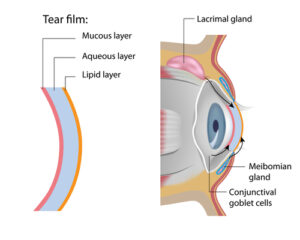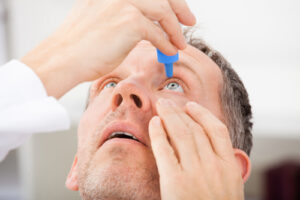How Do You Treat Dry Eyes?
Do you ever experience a stinging, scratching, or burning sensation in your eyes? If so, you might have dry eye syndrome.
Nearly sixteen million Americans have this condition, but it doesn’t have to impact your everyday life. Seeing your eye doctor can help you relieve your symptoms using a range of proven methods.
Keep reading to learn more about dry eye syndrome and how you can restore moisture to your eyes!
What Is Dry Eye Syndrome?
Dry eye syndrome is an eye condition that results from a lack of adequate lubrication in the eye. A disruption to the tear film causes it.
The tear film should have several layers to be healthy. The outer layer has mucus covering the cornea.

The mucus allows the tear film to adhere to the eye. The middle aqueous layer supplies oxygen, moisture, and other nutrients to the cornea.
The third outer lipid layer consists of oil. The oily layer seals the tear film on the eye, preventing evaporation.
There are several glands in the eye that aid in tear production. The lacrimal gland creates the water layer, while multiple smaller glands produce the oil and mucus layers.
If you’re experiencing symptoms of dry eye syndrome, it can indicate a complication with any aspect of this tear production process. Having eyes that feel drier can be part of the normal aging process.
Dry Eye Causes
Sometimes, this is simply because your body produces significantly less oil due to getting older. When there’s not enough oil, the tear film can evaporate more quickly, prompting areas of the cornea to dry out.
For women, hormonal changes related to menopause can cause this condition. It can also occur during pregnancy when the hormones are constantly in flux.
There are also a variety of environmental factors that can cause dry eyes. Hot, dry, or windy climates, high altitudes, air conditioning, and cigarette smoke can reduce lubrication and make your eyes feel itchy and lacking proper moisture.
Certain medications and diseases can also increase your risk of developing dry eye syndrome. If you wear contact lenses, it can lead to symptoms of dryness if your contacts interfere with the natural function of the tear film.
Some thyroid conditions, a vitamin A deficiency, and diseases such as Parkinson’s and Sjogren’s syndrome can lead to dryness too. Make sure you tell your eye doctor your complete medical history and all medications you’re currently taking to ensure these get taken into account.
What Are the Symptoms of Having Dry Eyes?

If your eyes feel dry because you’re not producing enough tears, or the tears produced are low in quality, you may experience:
- Itching
- Burning
- Scratchiness
- Redness
- Irritation
- Blurred vision that improves with blinking
- Watery eyes
- Increased discomfort after activities like reading or looking at a computer
If you are experiencing any of these symptoms, schedule an appointment with one of the talented ophthalmologists at Complete EyeCare West. If you suspect you may have dry eye syndrome, we will start by offering a comprehensive evaluation. We will also discuss relieving your symptoms for your comfort and health.
Your exam will involve measuring the production, evaporation rate, and effectiveness of the tear film. We often use special drops to detect problems, diagnose dry eyes, and determine the extent of dryness.
Once your eye doctor determines if you have dry eyes, it will be much easier to understand the root cause of the dryness.
How Can Dry Eye Be Treated?
Fortunately, there are a variety of treatments available to alleviate symptoms of dry eye and restore the health of your eyes.

You have probably heard of artificial tears, often recommended for those with mild dryness. These lubricating drops are available over the counter, and you can use them as frequently as you need to. We would be happy to discuss which brands might work best for you.
Another treatment option is prescription eye drops. Prescription eye drops are often recommended if you have more severe symptoms of dry eye that other treatments haven’t helped.
Restasis and Xiidra are two popular brands. Adding moisture back to the eye reduces inflammation and offers relief. If inflammation is a concern, in addition to having dry eyes, your eye doctor may prescribe a steroid eye drop.
Punctal plugs are also available. These special plugs are implanted into the eye to trap tears and maintain lubrication. Some plugs are temporary, dissolving after a certain period, while others are permanent.
Additional treatment options include meibomian gland expression, warm compresses, and strong pulsed light treatments. Recommended treatments will depend on the severity of your dry eye symptoms.
Alleviate Your Symptoms with Lifestyle Changes
Taking medication is not the only thing you can do to relieve dry eye symptoms. It is difficult for your eyes to maintain proper moisture if your entire body is not adequately hydrated.
Drink Enough Water
Be sure to drink eight to ten glasses of water each day. Staying hydrated throughout the day helps to flush potentially harmful impurities out of your system too.
Consume Enough Omega-3 Fatty Acids

There are also specific nutrients that can aid the body in its tear production. A diet rich in omega-3 fatty acids can help reduce irritation and sensations of grittiness.
Fatty fish such as tuna, mackerel, and sardines contain this essential vitamin. You can also find omega-3 fatty acids in nuts and seeds, vegetable oil, and green, leafy vegetables. You might consider a supplement as well.
Reduce Screen Time

If possible, you should reduce your screen time, as this can cause additional strain. If you cannot avoid looking at a computer or another screen for a certain time, take regular breaks.
A good rule of thumb is the 20-20-20 rule: every twenty minutes spent using a screen, look away at something twenty feet away for twenty seconds.
Adjust Your Screen Height
In addition, it is a good idea to move your screen back so that it is at least sixteen inches away. Adjust the settings, so the brightness is not too harsh on your eyes.
Are you bothered by symptoms of dry eye? The first step in finding relief is scheduling an appointment with Complete Eyecare West in Columbus, OH. Contact us today to see—and live—without discomfort!







